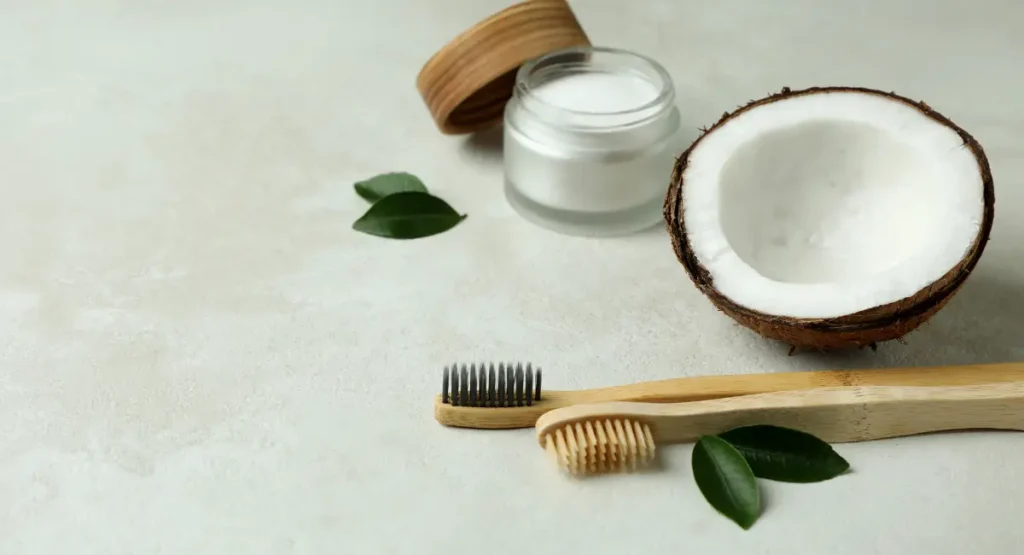The quest for a brighter smile has led many to explore teeth whitening options. While commercial products are popular, natural alternatives are gaining attention for their gentle and holistic approach. Among these, coconut oil stands out as a popular choice. But does coconut oil really whiten teeth?
This blog post aims to uncover the truth and potential benefits behind this trend. It offers insights for dental care enthusiasts, natural health advocates, and beauty blog readers.
Contents
- 1 Diving Into Coconut Oil
- 2 What Science Says About Coconut Oil And Teeth Whitening
- 3 Coconut Oil Vs. Other Whitening Methods
- 4 Coconut Oil For Teeth Whitening: A Step-By-Step Guide
- 5 Knowing The Risks Of Coconut Oil For Teeth Whitening
- 6 Gathering Real User Experiences
- 7 Drawing Conclusions On Coconut Oil For Teeth Whitening
- 8 Frequently Asked Questions (FAQs)
- 8.1 Can Coconut Oil Really Whiten Teeth?
- 8.2 How Often Should I Use Coconut Oil For Teeth Whitening?
- 8.3 Are There Any Side Effects Of Coconut Oil For Teeth Whitening?
- 8.4 Does Coconut Oil Work Better Than Commercial Teeth Whitening Products?
- 8.5 How Long Does It Take To See Results From Coconut Oil Teeth Whitening?
- 8.6 Is Coconut Oil Safe For Daily Teeth Use?
Diving Into Coconut Oil
Coconut oil is a natural oil extracted from mature coconut meat. It’s packed with medium-chain triglycerides, primarily lauric acid, renowned for its antibacterial properties. Many believe that these properties can contribute to oral health by reducing harmful bacteria in the mouth. This, in turn, might help remove plaque and surface stains, giving teeth a whiter appearance.
Understanding Lauric Acid
Lauric acid makes up 50% of coconut oil. It’s known for its ability to combat bacteria, fungi, and viruses. Lauric acid’s antibacterial nature can help maintain oral hygiene and whiten teeth. By reducing oral bacteria, coconut oil could potentially prevent plaque and stains buildup, although more research is needed to confirm its direct impact on tooth color.
The Belief In Natural Whitening
Many advocates of coconut oil for teeth whitening base their claims on traditional practices like oil pulling. This ancient Ayurvedic technique involves swishing oil in your mouth for 15-20 minutes, drawing out toxins and impurities. While anecdotal evidence supports its oral health benefits, its whitening effects remain largely unsubstantiated by scientific studies.
Also Read : Clove Oil And Toothache Relief Made Easy
What Science Says About Coconut Oil And Teeth Whitening
In recent years, researchers have begun to explore coconut oil’s efficacy as a teeth-whitening agent. Some studies suggest that coconut oil may improve overall oral health, but its whitening capabilities are less certain.
Scientific Evidence
A review of scientific literature reveals that while coconut oil can reduce harmful bacteria in the mouth, there’s limited evidence supporting its effectiveness specifically for teeth whitening. The American Dental Association highlights that coconut oil’s whitening effect is more anecdotal than scientifically proven.
Expert Opinions
Dental professionals offer varied perspectives on coconut oil for teeth whitening.
Dr. Michael Simpson, DDS, states,
“Coconut oil pulling can contribute to oral hygiene, but its whitening effects are more anecdotal than proven through scientific research.”
Similarly, Dr. Lisa Chen, a periodontist, adds,
“The lauric acid in coconut oil has known antibacterial properties, which may help with gum health and reducing plaque, but its direct impact on teeth whitening is not well-documented.”
Limitations Of Existing Research
Current studies on coconut oil’s whitening effects are often small-scale or lack control groups, making it difficult to draw definitive conclusions. While there’s potential for coconut oil to serve as a supportive element in oral care, its role as a primary teeth-whitening solution needs further exploration.
Also Read : The Clove Oil Conundrum: Solving Toothaches Naturally
Coconut Oil Vs. Other Whitening Methods
When considering teeth-whitening options, it’s helpful to compare coconut oil with other natural and commercial methods to understand its place on the spectrum.
Natural Whitening Alternatives
Baking soda, hydrogen peroxide, and activated charcoal are popular natural whitening agents. Each has its own mechanism and effectiveness. For instance, baking soda is mildly abrasive, removing plaque and stains, while hydrogen peroxide bleaches. In contrast, coconut oil’s primary action is antibacterial rather than abrasive or bleaching, which limits its immediate whitening capacity.
Commercial Whitening Products
Commercial products like whitening strips and professional treatments offer more potent and immediate results due to their chemical compositions. These methods, while effective, can also cause side effects like tooth sensitivity and gum irritation. Coconut oil offers a gentler, albeit slower alternative without harsh chemicals.
Weighing The Pros And Cons
Coconut oil is a low-cost, natural option that promotes oral health. However, its whitening effects are gradual and less pronounced than commercial products. It can be beneficial as a complementary practice alongside other whitening treatments for those looking to avoid chemicals.
Also Read : Discover The Power Of Oil Of Clove For Toothache Relief
Coconut Oil For Teeth Whitening: A Step-By-Step Guide

If you’re curious about coconut oil into your oral care routine, here’s how to start oil pulling. This is a popular method of using coconut oil.
Getting Started With Oil Pulling
- Choose High-Quality Oil: Select organic, cold-pressed coconut oil for the most effective results.
- Measure a tablespoon: Use about 1 tablespoon of coconut oil. It will melt quickly in your mouth.
- Swish and pull: Swish the oil around your mouth for 15-20 minutes. Focus on pushing and pulling the oil between your teeth.
- Spit It Out: After swishing, spit the oil into the trash to avoid clogging pipes. Do not swallow the oil as it contains toxins and bacteria.
- Rinse and brush: Rinse your mouth with warm water and brush your teeth.
How Often To Use
For most effective results, oil pulling should be done daily. Many users report cleaner teeth and fresher breath after just a few uses.
Setting Realistic Expectations
Coconut oil is more about improving oral health and brightening teeth over time than delivering dramatic whitening results. Patience is key.
Also Read : Unveiling The Mystery: How Does Lyme Disease Make Your Teeth Fall Out?
Knowing The Risks Of Coconut Oil For Teeth Whitening
While coconut oil is generally safe, there are some considerations and potential downsides to remember.
Potential Issues
- Cavity Risk: If not rinsed thoroughly, leftover oil residue can attract bacteria, increasing cavity risk.
- Drain Problems: Spitting oil into drains can cause clogs over time. Always dispose of it in the trash.
- Limited Whitening: Don’t expect drastic changes in tooth color with coconut oil alone.
Clearing Up Misconceptions
Contrary to some claims, coconut oil cannot reverse tooth decay or substitute for regular dental check-ups. It’s a supplement to oral hygiene, not a replacement for conventional care.
Professional Recommendations
Dr. James Rodriguez, a cosmetic dentist, advises,
“While coconut oil may provide a slight whitening effect by removing surface stains, it’s important to remember that it cannot replace professional dental whitening treatments.”
Also Read : How To Heal A Cracked Tooth Naturally in Five Miracle Ways
Gathering Real User Experiences
Hearing from those who have tried coconut oil for teeth whitening can provide a personal perspective on its effectiveness.
Testimonials And Stories
Sarah M., Natural Health Enthusiast:
“I’ve been using coconut oil for oil pulling every morning for a month now, and not only do my teeth feel cleaner, but I’ve noticed a subtle whitening effect. It’s become an essential part of my daily oral care routine.”
Alex K., Beauty Blogger:
“After reading about coconut oil’s potential benefits for teeth, I decided to give it a try. I can honestly say that it has made a noticeable difference in the color of my teeth. I’m impressed with the natural results!”
Dental Checkup Results:
“I was skeptical at first, but after consistent use of coconut oil for oil pulling, my dentist noticed a reduction in plaque and a brighter smile during my last visit.”
Factors Influencing Effectiveness
Individual results can vary based on factors like diet, oral hygiene practices, and genetic predispositions. Users should approach coconut oil with an open mind and realistic expectations.
Recommendation : Unveiling Honest ProDentim Reviews for Dental Power and Precision – Updated 2024
Drawing Conclusions On Coconut Oil For Teeth Whitening
Coconut oil is emerging as a promising ally for oral health. This makes it a fantastic addition to your dental care routine, especially if you lean towards natural remedies. While it may not replace commercial teeth-whitening products, coconut oil’s benefits in supporting proper dental hygiene and providing mild whitening effects are definitely worth considering.
By incorporating coconut oil alongside your regular brushing and flossing habits, you can create a comprehensive approach to maintaining optimal oral health. For those passionate about natural wellness, adding coconut oil to your routine can be a game changer. However, if you’re seeking significant whitening results, it’s always advisable to consult a dental professional for personalized advice tailored to your needs. Embrace coconut oil and elevate your dental care today!
Frequently Asked Questions (FAQs)
Can Coconut Oil Really Whiten Teeth?
Coconut oil can remove some surface stains and improve oral health, potentially leading to a whiter appearance. However, it’s not a substitute for professional whitening treatments.
How Often Should I Use Coconut Oil For Teeth Whitening?
Daily use is recommended for those incorporating coconut oil into their oral care routine. Consistency is key for gradual improvements.
Are There Any Side Effects Of Coconut Oil For Teeth Whitening?
Coconut oil is safe, but users should ensure proper rinsing to avoid cavity risks and dispose of oil properly to prevent plumbing issues.
Does Coconut Oil Work Better Than Commercial Teeth Whitening Products?
Coconut oil offers a gentler approach but with less dramatic results than commercial products, which are designed for whitening effects.
How Long Does It Take To See Results From Coconut Oil Teeth Whitening?
Results vary, but some users notice changes over a few weeks with consistent use. Remember, coconut oil supports overall oral health rather than whitening.
Is Coconut Oil Safe For Daily Teeth Use?
Yes, coconut oil is safe for daily oral care use, provided it is used correctly and supplemented with other dental hygiene practices.
Sources and Resources
- American Dental Association (ADA) – Oil Pulling: Fact or Fiction?
- Dr. Axe – Coconut Oil for Oral Health
- Healthline – The Benefits of Oil Pulling
- Journal of Clinical and Diagnostic Research – Efficacy of Coconut Oil in Reducing Plaque and Gingivitis
- WebMD – Coconut Oil: Health Benefits & Uses
Recommended Articles
- Top 5 Mistakes After Knee Replacement: A Journey to Optimal Recovery
- Unlocking The Truth : Do Shrooms Show Up On A Drug Test ?
- Unveiling 10 Warning Signs of Mold Toxicity – You Can’t Ignore It
- How To Get Rid of a Sore Throat From Vaping? Effective Techniques
- How To Use Turmeric For Hair Removal ? Does It Really helps ?
- How To Get Rid Of Eczema Scars Naturally And Professionally











